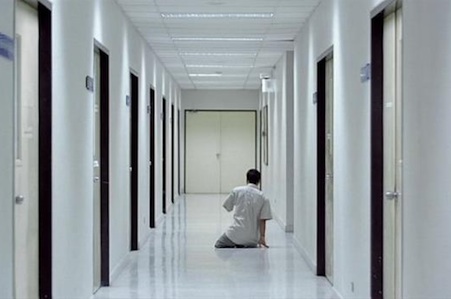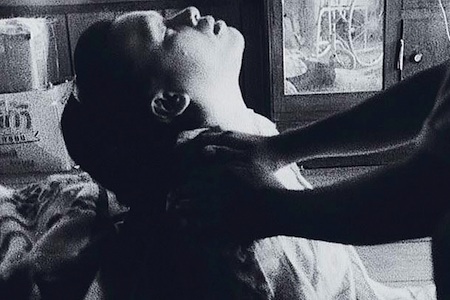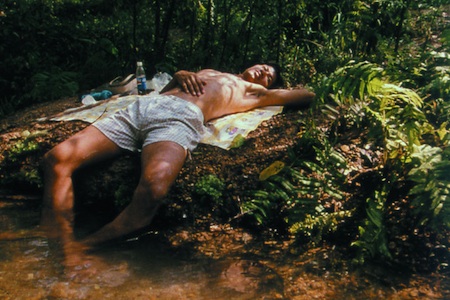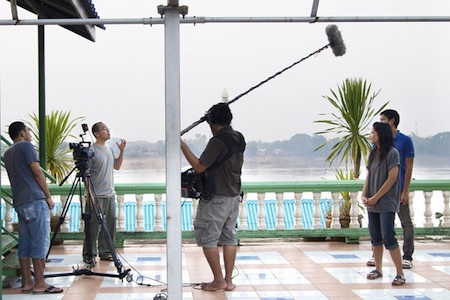On the occasion of the Morakot Hotel-related exhibition opening at the Berkeley Art Museum this Friday (as well as the recent Northern European debut of his hour-long Mekong Hotel at the International Film Festival Rotterdam and the Göteborg/Gothenburg International Film Festival), we revisit this interview from 2005 between Fandor co-founder Jonathan Marlow and the critically lauded Thai filmmaker/installation artist Apichatpong Weerasethakul.
Jonathan Marlow: Your films often reside at the intersection between documentary and fiction. How did this interest in contrasts develop?
Apichatpong Weerasethakul: I wasn’t really conscious about this. It came naturally. I like to observe what is happening. For instance, I really like watching people pass by and that is why I really like Andy Warhol’s films. It’s more like observing what is going on and the audience makes up the narrative themselves.
Marlow: When did you have an opportunity to see Warhol’s films?
Weerasethakul: In fact, I haven’t seen them! I just read about them when I was in the States. I had a lot of information about his films and about his life. Which is better. I can have his films in my head.
Marlow: You received your MFA from the Art Institute of Chicago, studying there from 1994 to 1997. How did you decide to complete your degree in Chicago?
Weerasethakul: During that time in Thailand, there was no film school that interested me and I didn’t know what I was looking for. Chicago was the last place that had the latest deadline for application. I think I was lucky to get into that school. As I say, I didn’t know what I was looking for. Whatever film school was in the U.S. must be good. I went to Chicago and discovered experimental cinema. It was something that made me think, ‘Oh, this is what I always wanted to do but I didn’t know how to explain it.’
Marlow: You studied architecture before that?
Weerasethakul: Yes. I was in Khon Kaen, my hometown, and the architectural department had just opened. I knew I wanted to make films but there was no film school and I felt like architecture at that time was very interesting to me. It helped a lot until now.
Marlow: Your study of architecture informs your film work as well?
Weerasethakul: Yes, even now. I discovered many similarities between that and structural films from the American experimental camp. When I plan my films, it helps in terms of structure. I look at the whole film as a building and, in physical terms, when I look at the space, a particular film is very… How do I approach this? It’s like when an audience walks through a building. What do you have for them? That corner? How big is the space? It’s applied directly when it comes to filmmaking.
Marlow: When you returned to Thailand, you curated the first Bangkok International Art Film Festival, which later evolved into the Bangkok Experimental Film Festival. As a result, you’ve encouraged other young Thai filmmakers to embrace experimental film.
Weerasethakul: It was really well received although there were not that many people [in attendance]. We had a quality audience. Some of these people became filmmakers and they are still active in the film community. Before we founded the film festival, there were no other festivals at all in Thailand. Afterwards, there were other festivals. Perhaps, I think, people had been thinking about starting a festival but never actually did it. Or, when we did it, we gave people the confidence to do it as well.
Marlow: With your video installation work, do you approach those projects differently than your short films and feature-length works?
Weerasethakul: Sometimes yes, sometimes no. The similarity is… the main idea, the main concept. They’re the same but video works give me more freedom. They’re very expressive and somehow now it turns out that my video works are often sketches for my feature films. It’s more abstract and I can experiment with the medium, the video, and it doesn’t need a lot of people. It’s just me and the camera so it is very intimate. It’s a way to explore and sketch certain moods, certain emotions for film. They coexist quite well in that way.
Marlow: Would you say any of the earlier shorts were a direct starting point for your first feature or were they different enough that your first feature was something else altogether? When you look at the Like the Relentless Fury of the Pounding Waves, you’re exploring ideas of time and space that seem to evolve in Mysterious Object at Noon, but they’re obviously quite different.
Weerasethakul: For me they are the same in the way that I try to get a feeling with the camera and explore how I can capture the ordinary events in life. Relentless is something like that but with very little planning. I get the feeling of the environment spontaneously so it is a very similar working method as Mysterious Object at Noon. It continues until now, this way of working.
Marlow: It seems that the construction of your work challenges (particularly here in the United States) our notions of what is or isn’t documentary, in much the same way that Marcel Duchamp and Joseph Cornell challenged what could be accepted as art. Are you seeing the influence of your work starting to spread through Thailand and other peoples’ films?
Weerasethakul: I do, actually. You mean as an influence, yes? It’s very common for everyone to make films. Before it was quite limited in terms of equipment and now so many kids are making videos. Five or six years ago, there was a lot of work dealing directly with social issues quite outside of the personal style. Now we see a lot more people who are just talking about themselves. I think this is a better way because it reflects the society they’re living in. In a personal way, that’s more interesting. The studios in Thailand are tapping into this area as well by hiring fresh graduates to direct a video and then go to film or direct a film cheaply. I think that the mood of making my kind of films is getting stronger here.
Marlow: It certainly doesn’t hurt that your films are well-received throughout the world. Your association with 9/6 Cinema Factory ended around the time that you either started or finished Mysterious Object at Noon. Is that right?
Weerasethakul: Yes.
Marlow: At what point in the conception of your first feature film did you introduce the notion of the exquisite corpse as a storytelling device? Presumably, it was really early in the process.
Weerasethakul: It’s actually the main concept with which we started the film. It’s the whole film.
Marlow: How carefully planned was the journey in advance of taking up the project? Or was it fairly carefree as you traveled around?
Weerasethakul: We only knew that we would travel from the north to the south. Along the way, of course, we had to plan when we drove around the country and around the city. In the north we just looked at the landscape and, for example, saw farmers, so we planned: ‘Okay, let’s do that as the subject.’
Marlow: Were there any unexpected challenges when you were working on this film? Were there any surprises?
Weerasethakul: Yes. The way that people tell stories. For example, the kids are very open and very imaginative. I just realized later that it’s influenced by the way they live. They’re school kids, very influenced by comics and television. They just want to have fun and collect images. We didn’t consciously think about social issues and about making this documentary fiction. The relationship between people and the social just occurred to us later. Then we could make the story interesting.
Marlow: How many people did you have working on Mysterious Object at Noon?
Weerasethakul: About ten people. That’s all.
Marlow: And you shot for how many weeks?
Weerasethakul: We had several traveling trips so I cannot tell you exactly. Sometimes, it was about twenty people, thirty people on the set and sometimes it was ten people. It depended on the budget in each area. I couldn’t have the volunteers the whole time. The trip to the north was twenty people. I stopped in Bangkok and changed the crew. That’s what it was like.
Marlow: With Blissfully Yours, you’re playing again with film structure. It is very unconventional (for instance) to begin the opening credits about a third of the way into the film. I suspect you were disappointed when the film was banned in Thailand?
Weerasethakul: I was disappointed because the film was censored before and the film was not banned. The DVD and the VCD was banned. The version that they put out I don’t think of it as my film because the color was wrong and they reshuffled the order of the scenes. In a way, I was glad that it was banned. In another way, it was bad to ban it for sexual content. But that’s changing.
Marlow: Were you consciously trying to push those boundaries when you shot those scenes? It was an integral part of the story.
Weerasethakul: I made a film that I want to see. When making films, it’s very boring to do the same thing. I have to balance it so it’s not too much just for the sake of doing something different. For example, the opening credits originally came at the beginning but (when we repeated them) it just made sense to put them in the middle. This idea wasn’t planned in advance. So when we make a film we keep the possibilities open. As long as it seems right to us, we just do it. I’m lucky to have all the producers for all of the films; they are very open and just let me do whatever I want. That’s what they want also.
Marlow: The titles come at a point where the film is, in essence, starting over. It’s going in another direction from that point and it does feel very natural and unforced for it to happen there. Your third feature was a collaboration with Michael Shaowanasai entitled The Adventures of Iron Pussy. Michael is an alumni of the San Francisco Art Institute where parts of this story were first developed. Mingmonkul Sonakul (director of Kuen pra chan tem doueng/I-San Special) also studied at the San Francisco Art Institute. Was there a particular appeal of San Francisco for these filmmakers? Was it by chance that they both ended up here?
Weerasethakul: I think so. I don’t know. I also almost went there in the beginning.
Marlow: Their acceptance date was too early?
Weerasethakul: I think the money was not convenient for me. When I went there last year, I felt that it was very different from other U.S. cities. It felt very liberated and I think that’s why these two filmmakers are so different from others. But Michael went to Chicago later and that’s how I got to know him.
Marlow: Is it likely that you and Michael will collaborate again on another project?
Weerasethakul: We’re trying to… We would like to make Iron Pussy as an old-style Japanese animated film but we’re looking for money.
Marlow: Are you looking in Japan or elsewhere?
Weerasethakul: We looked in Japan and it’s still being kind of considered at the studio. But still, I’m doing many things at once.
Marlow: You still have museums approaching you to do installations. You’re quite busy.
Weerasethakul: I try to focus more on feature films now but it is impossible. There are other jobs that pay better than doing a film. Video installations, surprisingly.
Marlow: The direction that you, Michael and Mingmonkul have traveled is quite different than the path of the Thai directors that come from an advertising background like Wisit Sasanatieng and Pen-Ek Ratanaruang. Is it likely that over time there will become an overlap between the work that they do and the work that you do? Do you like their work at all?
Weerasethakul: I am curious because I think Wisit and Pen-Ek are getting much more personal, getting away from the commercial style. It’s very likely that we will collaborate at some point.
Marlow: With Tropical Malady, you received the Special Jury Prize at Cannes. This was quite an endorsement of your work. It is very rare for someone to receive such recognition early in their career.
Weerasethakul: It was already enough for me that the film was in the competition. To get the prize was great, of course, but I just didn’t think much about it. I just thought, ‘Okay, a competition. I’m happy.’ I think somehow it was too early. I don’t know. Now I’m just getting more confidence in getting more personal in my work. I think the prize gave me that confidence. Still, I don’t feel that I want to make films for film festivals. It gets to be part of the marketing process. I mentioned the kind of pressure from producers and expectations from producers to have films in Cannes and films in festivals. Now I think the pressure is gone. Now we just make films without thinking, ‘Oh, this is for the festivals.’ There’s more freedom.
Marlow: Strand is releasing Tropical Malady here in the United States and it sounds like your relationship with Strand Releasing and Marcus Hu is good. Will they also distribute Blissfully Yours?
Weerasethakul: I have to send Marcus the DVD. It came out in Bangkok but I’m still waiting for the company to get it to me then I’ll send it to Marcus. It’s part of the ongoing relationship. [Strand ultimately did, indeed, distribute Blissfully Yours along with Tropical Malady and a number of his other films.]
Marlow: What other projects are you developing right now?
Weerasethakul: I’m shooting a forty-minute video called Worldly Desires. It’s about a jungle in the future. The futuristic jungle. They remember that the humans came to shoot a music video so every day and night the jungle recreates these activities. It’s kind of an experimental video. That will shoot this month. I am also planning a feature film, not yet titled, about my family. It’s about my mother and my father before they had me.
Marlow: And you will shoot that in Khon Kaen?
Weerasethakul: Yes, in Khon Kaen. I’m not sure because we need to find a small town and Khon Kaen is now very big.
Marlow: You will have to find an ersatz Khon Kaen.
Weerasethakul: In this film, I plan to collaborate with a fortune teller to see my parents’ past lives. I will bring the story of their past lives to the real past, also.
Marlow: When do you think this’ll go into production?
Weerasethakul: The shooting may be around September or October.
[This nascent film was ultimately released as Syndromes and a Century, five years before Apichatpong Weerasethakul would win the Palme d’Or at the 2010 Cannes Film Festival for Uncle Boonmee Who Can Recall His Past Lives].







